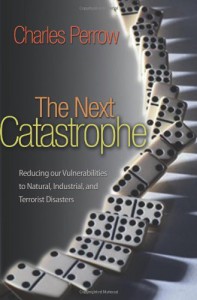
Superb, Crystal-Clear, Speaks Truth to Power, April 3, 2008
Charles Perrow
Amazon destroyed this review in error and I failed to keep a file copy. This is a reconstructed review–not nearly as good as the original–nothing I can do about it.
———-reconstructed review————-
This book is a learned essay, and I immediately discerned (I tend to read the index and bibliographies first, to understand the provenance of the author's knowledge) that the author has excelled at both casting a very wide net for sources, and at distilling and presenting those sources in a useful new manner with added insights.
Key points:
Natural disasters impact on 6 times more people than all the conflict on the planet.
Industrial irresponsibility, especially in the nuclear, chemical, and biological industries, is legion, and much more potentially catastrophic than any terrorist attack. Of special concern is the storage of large amounts of toxic, flammable, volatile, or reactive materials outside the security perimeters–this includes spent nuclear fuel rods, railcars with 90,000 tons of chlorine that if combined with fire would put millions at risk.
The entire book is an indictment of the Department of Homeland Security (DHS) which the author says was designed for permanent failure (at the same time that it took over and then gutted the Federal Emergency Management Agency (FEMA)).
The author focuses on how concentrations of people, energy, and high-value economic targets make us more vulnerable than we need to be. Dispersal, and moving small amounts of toxic materials (just enough just in time, rather than a year's supply on site), can help.
The author outlines five remediation strategies:
REDUCTIONS of amounts
TRANSFERS from outside the wire to inside the wire
SUBSTITUTION (e.g. of bleach for chlorine)
MIND-SET SHIFT to emphasize public safety and regulation over profit
REFORM of the political system, where federal laws now set CEILINGS for safety rather than floors (one of many reasons we have 27 secessionist movements in the USA–the federal government is insolvent and abjectly corrupt and incapable).
We learn that post-9/11 we have spent tens of billions on counter-terrorism to ill-effect, while completely neglecting rudimentary precautions and protections against natural and industrial disasters that will inevitably turn into catastrophes for lack of competent organizations.
The author emphasizes that complex systems will fail no matter what, but it is much more dangerous to the public if the government and the industrial executives refuse to do their jobs. The author coins the term “executive failure” to describe top leaders who deliberately decide to ignore federal regulations on safety, and describes a number of situations where near-nuclear meltdown and other disasters came too close to reality.
The power grid, PRIOR TO deregulation, is treated as a model of a system that developed with six positive traits:
1. Bottom-up
2. Voluntary alliances
3. Shared facilities at cost
4. Members support independent research & development
5. Oversight stresses commonality interdependence
6. Deregulation is harmful to public safety
The author sums up the enduring sources of failure as:
ORGANIZATIONAL — flawed by design (pyramidal organizations cannot scale nor digest massive amounts of new fast information)
EXECUTIVE — deliberate high crimes and misdemeanors, seeking short-term profit without regard to long-term costs to the public safety. “We almost lost Toledo.” Buy the book for that story alone.
REGULATORY — the corruption of Congress, now known to be legendary.
The author tells us that globalization has eliminated the “water-tight bulkheads” within industries and economies, meaning that single points of failure (like the Japanese factory making silicon chips) can impact around the world and immediately. The author prefers to nurture networks of small firms, and this is consistent with other books I have read: economies of scale are no longer, they externalize more costs to the public than they save in efficiencies.
The book ends with an overview of the Internet, which is not the author's forte. He notes that our critical infrastructure is connected to the Internet, but I like to add emphasis here: all of our SCADA (supervisory control and data administration) are on the Internet and hackable.
I like very much the author's view that Microsoft and others should be held liable for security blunders that cost time and money to the end users. I recall that Bill Gates once said that if cars were built like computers they would cost very little and run forever….to which the auto industry executive replied: yes, and they would crash every four blocks and kill every fourth person (or something along those lines). We still do not have a desktop analytic suite of tool because of proprietary protections for legacy garbage.
I am certain that We the People can live up to the promise contained in Collective Intelligence: Creating a Prosperous World at Peace which, as with all books I publish, is free online as well as being offered by Amazon for those who love to hold and read and annotate hard copy.
Here are other books I recommend all of which support the author's very grave concerns about our irresponsibility as a Nation:
Pandora's Poison: Chlorine, Health, and a New Environmental Strategy
The Blue Death: Disease, Disaster, and the Water We Drink
The Cheating Culture: Why More Americans Are Doing Wrong to Get Ahead
The Informant: A True Story
Conspiracy of Fools: A True Story
The Republican War on Science
The Price of Loyalty : George W. Bush, the White House, and the Education of Paul O'Neill
The Soul of Capitalism: Opening Paths to a Moral Economy
The Long Emergency: Surviving the End of Oil, Climate Change, and Other Converging Catastrophes of the Twenty-First Century




